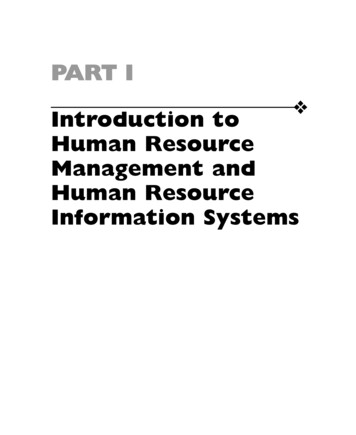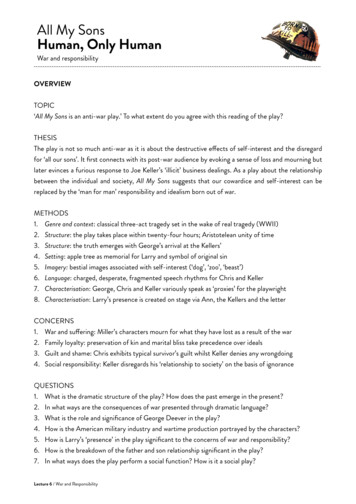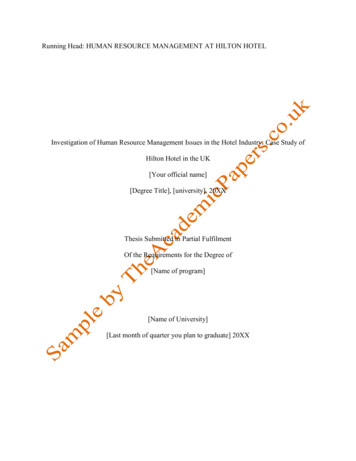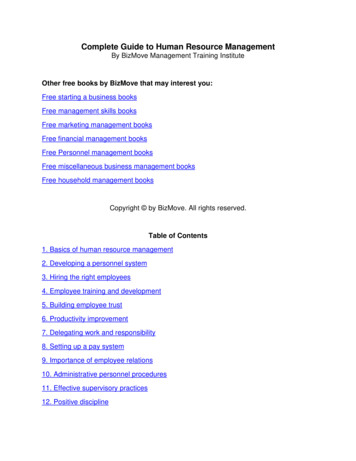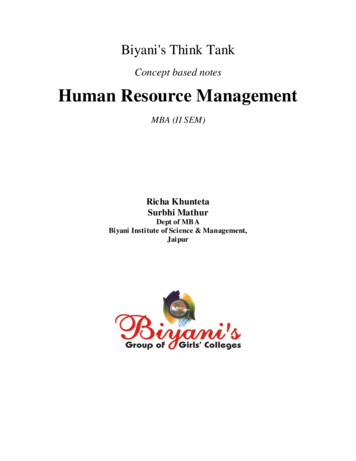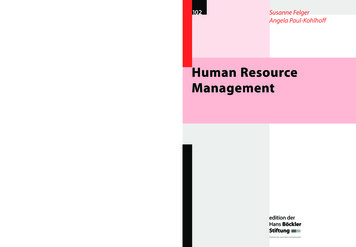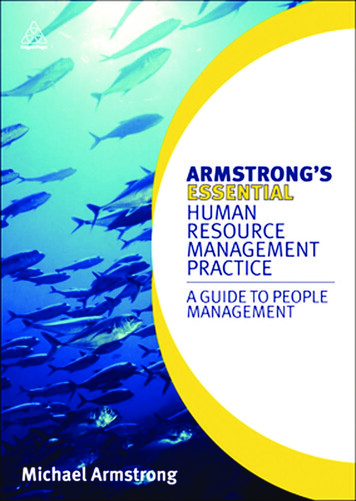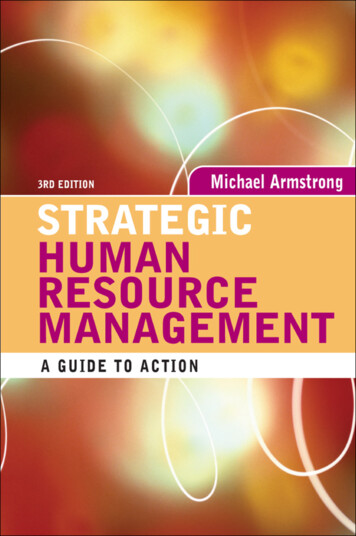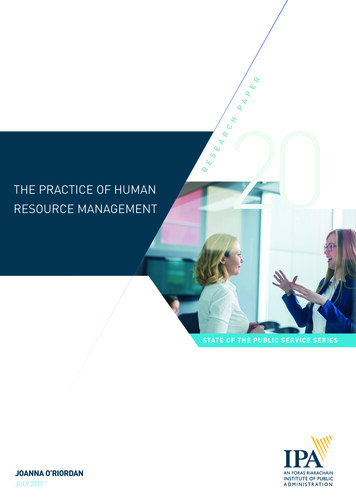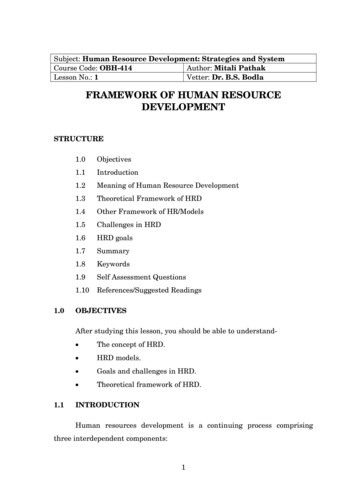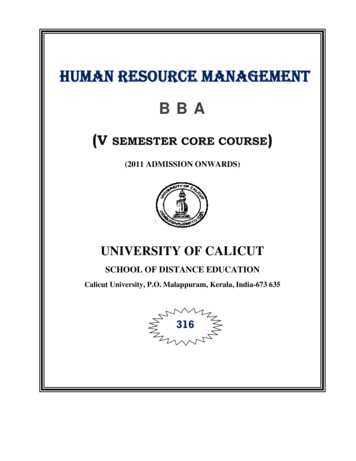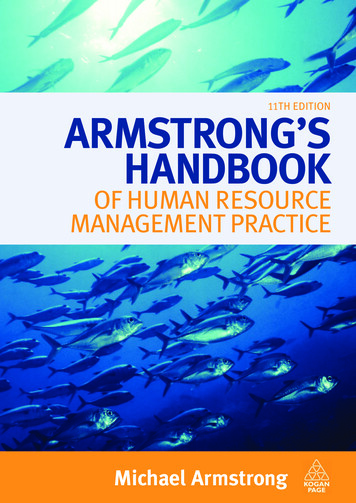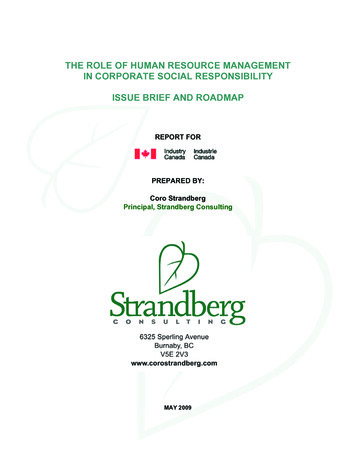
Transcription
THE ROLE OF HUMAN RESOURCE MANAGEMENTIN CORPORATE SOCIAL RESPONSIBILITYISSUE BRIEF AND ROADMAPREPORT FORPREPARED BY:Coro StrandbergPrincipal, Strandberg ConsultingMAY 2009
CSR and HR Management Issue Brief and RoadmapISSUE BRIEF AND ROADMAPOBJECTIVE To understand the foundational elements that need to be in place to foster a highperformance CSR (corporate social responsibility) organization and develop aframework or roadmap for firms wishing to become a high performing CSRorganization.AT A GLANCE Human resource professionals have a key role to play to help a company achieve itsCSR objectives. Employee involvement is a critical success factor for CSRperformance. Human resource managers have the tools and the opportunity toleverage employee commitment to, and engagement in, the firm’s CSR strategy. High performing CSR organizations foster a culture of CSR and fully integrate CSRthroughout their operations, rewarding and incentivizing CSR decisions andinitiatives. Employees prefer to work for organizations aligned with their values; thus,incorporating CSR into the employee brand can enhance recruitment and retention,particularly in tight labour markets. CSR can be applied to the HR toolkit, resulting in a roadmap or pathway for humanresource practitioners to follow who wish to contribute to the achievement of theirorganization’s sustainability and business aspirations, thereby improving social andenvironmental conditions locally and globally.2
CSR and HR Management Issue Brief and Roadmap3
CSR and HR Management Issue Brief and Roadmap4
CSR and HR Management Issue Brief and RoadmapINTRODUCTIONHuman resource managers are well positioned to play an instrumental role in helpingtheir organization achieve its goals of becoming a socially and environmentallyresponsible firm – one which reduces its negative and enhances its positive impacts onsociety and the environment. Further, human resource (HR) professionals inorganizations that perceive successful corporate social responsibility (CSR) as a keydriver of their financial performance, can be influential in realizing on that objective.While there is considerable guidance to firms who wish to be the best place to work andfor firms who seek to manage their employee relationships in a socially responsible way,there is a dearth of information for the HR manager who sees the importance ofembedding their firm’s CSR values throughout the organization, who wish to assist theexecutive team in integrating CSR into the company’s DNA. And as high profilecorporate failures such as Enron make all too clear, organizations that pay lip-service toCSR while neglecting to foster a CSR culture run the risk of damaging their corporatereputation if not their demise. Indeed, HR’s mandate to communicate and implementideas, policies, and cultural and behavioural change in organizations makes it central tofulfilling an organization’s objectives to “integrate CSR in all that we do.” That said, it isimportant to understand that employee engagement is not simply the mandate of HR.Indeed people leadership rests with all departmental managers. HR can facilitate thedevelopment of processes and systems; however, employee engagement is ultimately ashared responsibility. The more the HR practitioner can understand their leverage withrespect to CSR, the greater their ability to pass these insights along to their businesspartners towards the organization’s objectives in integrating CSR throughout theiroperations and business model.As human resources influences many of the key systems and business processesunderpinning effective delivery, it is well positioned to foster a CSR ethic and achieve ahigh performance CSR culture. Human resource management can play a significant roleso that CSR can become “the way we do things around here”. HR can be the keyorganizational partner to ensure that what the organization is saying publicly aligns withhow people are treated within the organization. HR is in the enviable position of beingable to provide the tools and framework for the executive team and CEO to embed CSRethic and culture into the brand and the strategic framework of the organization. It is theonly function that influences across the entire enterprise for the entire ‘lifecycle’ of theemployees who work there – thus it has considerable influence if handled correctly. HRis poised for this lead role as it is adept at working horizontally and vertically across andwithin the organization, so important for successful CSR delivery.Of course, for effective CSR deployment, it needs to become a Board and C-suiteimperative first. Should such an organizational gap exist, the senior HR leader canchampion, lead and help drive a CSR approach if necessary. In the coming years asCSR increasingly becomes part of the business agenda and the fabric of responsiblecorporations, it will become a natural agenda for the HR practitioner.The following is an overview of the key trends and business drivers for fostering thisCSR-HR connection, followed by a proposed roadmap or pathway for human resourceleaders seeking to make a substantial contribution to sustainability, CSR and their firm’sbusiness goals. A companion CSR-HR Checklist is available which summarizes theroadmap at a glance.5
CSR and HR Management Issue Brief and RoadmapTRENDS AND DRIVERSThere is emerging evidence that effectively implemented, CSR can have significantimpact in motivating, developing and retaining staff. Novo Nordisk, a high-value CSRpharmaceutical company in Denmark, for example, after launching their Values in Actionprogram, which aligns their business objectives with sustainable development principles,saw a 5% drop in staff turnover, while Sears found a 20% reduction in staff turnoversince implementing their CSR program. (Skinner, 2002, p.1). A landmark internationalCSR study of human resource practitioners conducted by the Society for HumanResource Management (SHRM) in 2006, reveals that CSR practices are seen asimportant to employee morale (50%), loyalty (41%), retention (29%), recruitment of topemployees (25%) and productivity (12%). [Note that percentages reflect Canadianresponses] (SHRM, 2007, p. 27).Globally, HR leaders are developing and implementing incentive and appraisal systemsthat reflect sustainability as well as hiring personnel that embody these values. Forexample, research by The Conference Board reveals that 50% of global managersreport their companies do, or plan to, include corporate citizenship (aka CSR) as aperformance evaluation category. Additionally, 68% of respondents cite the linkbetween corporate citizenship and performance appraisal as “increasingly important.”(Lockwood, 2004).However, while there are moves to incorporate CSR into human resource mandates,CSR leadership remains limited, piecemeal and anecdotal, as found in the SHRM studynoted earlier: while nearly 2/3rds of HR professionals interviewed were directly involvedin CSR activities, only 6% were mainly responsible for creating CSR strategy and only17% were charged with implementing the strategy.” [Canadian response rate.] (SHRM,2007, pp. 17 – 19).Research shows that the critical success factors for implementing CSR include havingan overarching vision that includes CSR, having senior management and board levelcommitment, engaged staff and the provision of skills, tools and incentives. Clearly,staff participation and buy-in to delivering on the company’s CSR aspirations is central tosuccess in this area. Documented case studies show that HR practices such ascompetency development, can help embed CSR in an organization, not to mentionbenefit the bottom line. (Redington, 2005). Companies with a good CSR reputation arebenefiting from the stakeholder view that a company’s behaviour and presumably that ofits people is aligned with CSR values, in a consistent way. Companies seeking to buildmarketplace trust and reputation must embed their CSR values throughout theirbusiness. Leading companies are realizing that CSR can be nested in the company’semployee brand and can be part of the value proposition for working at a given firm.Sustainable HR management is central to this objective.The report, Developing the Global Leader of Tomorrow, observed that “a range ofhuman resource levers are important for developing [CSR] organizational capabilities:building these knowledge and skills through leadership development programs, careerdevelopment planning, succession planning, performance management and incentivesystems and competency frameworks, and seeking these knowledge and skills whenrecruiting new talent into the organization”. (Ashridge, 2008, p. 10).6
CSR and HR Management Issue Brief and RoadmapAnother factor that compels an active role for human resource practitioners is thecentrality of employees to achieving any organizational objective. Indeed, withoutexception, every stakeholder mapping exercise names employees as one of the top fourpriority stakeholders, the others being shareholders, customers, and communities. As akey driver of value in any organization, employees need to be engaged in the task ofintegrating CSR throughout the firm, helping the firm achieve its CSR goals and adhereto its CSR principles consistent with its strategic business direction. Anything less thanthis is likely to breed cynicism and lead to reputational issues and a disconnectionbetween rhetoric and practice. The growing awareness that business value is more andmore a function of intangibles such as goodwill, reputation, trust, talent and intellectualcapital, makes this an increasingly important consideration.A labour market trend that is predicted to foster the connection between HR and CSR isthe upcoming “Facebook” generation, seeking to work for companies aligned with theirvalues and the baby-boomer employees who want to earn a living while giving back,who want their work to have more meaning. Julia Moulden, in her book “We are theNew Radicals: A Manifesto for Reinventing Yourself and Saving the World”, points totwo landmark studies of the boomer generation: 75% of this group want to keep workingand of that number 60% want to do make a positive difference. According to her math, inthe North American context, 30 million employees want to make a difference in theworld. Between the Facebook and baby-boomer cohorts, current and future employeeswill be increasingly more demanding of their employers on this dimension. Either way,HR leadership will be increasingly focused on the engagement of a new values-basedethic amongst employees, resulting in a focus on the internal brand and relationshipvalues. The current economic recession notwithstanding, people will increasingly havechoices in a constrained labour market and will want to devote their time and energy toorganizations aligned with their sustainability values.In this structural “war for talent”, employer differentiation will become more and moreimportant. People increasingly want to work for an organization that has a “conscience”,and values are key to building conscience. Thus, more and more companies will bedefining their organizational values in ways that are aligned with their mission and vision.“The way things are around here” will be married up with organizational goals andoutcomes. People prefer to work for companies that make a difference; corporatevalues, infused with CSR, generate conscience. Companies that walk their talk byembedding CSR throughout all they do will be the employer of choice in tomorrow’slabour market.The same holds for “today’s” labour market, embroiled as it is in the economic downturn.Many prospective employees will be seeking the basics of employment security andbelonging over employer conscience in the short term. Thus, companies will need to beyet more sophisticated and intentional about their CSR commitments, integrating theirCSR beliefs within the financial business model in order to survive the economic turmoilof 2009/2010. Companies with a conscience will have to prove they are stable andfinancially viable in order to attract talent – and they will have to step up their efforts tofully integrate their CSR value proposition to ensure they are not left with “Emperor’sNew Clothes” post recession. Indeed, companies that fail to fully engage theiremployees in the fulfillment of a robust business mission are likely to experiencedeclining productivity, which firms can ill-afford in the current economy.7
CSR and HR Management Issue Brief and RoadmapUnder any scenario, it is important that employees have their basic employment needsmet before they are called upon to help the organization achieve its CSR goals. Thispaper will not review the fundamentals of good workplace practices, although it isaccepted that they are critical to building the employee value proposition and inleveraging employee CSR engagement. To have a high performing team, it is essentialthat people receive the proper compensation and recognition for their work.Shareholders are another driver of the HR-CSR connection. Shareholders around theworld are pressuring companies to link executive compensation packages to thecompany’s sustainability performance, motivated in part by the prevalence of short-termand stock market-linked metrics in many executive compensation schemes (The EthicalFunds Company, 2006, p. 8) Active shareholders believe that compensation packagesbased primarily on achievement of short-term financial targets have the potential to detercompanies from undertaking those activities that create sustainable longer term value.For example, Ethical Funds wrote letters to all companies on the S&P/TSX CompositeIndex in 2006 asking after the integration of CSR factors in executive compensationschemes. They found that just 5% of TSX-listed companies incorporate environmental,social and governance factors into executive compensation packages. This is in markedcontrast to a 2005 survey of Canadian board directors, conducted by McKi
As human resources influences many of the key systems and business processes underpinning effective delivery, it is well positioned to foster a CSR ethic and achieve a high performance CSR culture. Human resource management can play a significant role so that CSR can become “the way we do things around here”. HR can be the key organizational partner to ensure that what the organization is .
